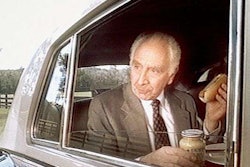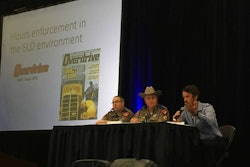On Friday at the Great American Trucking Show, the Real Women in Trucking group hosted a morning question-and-answer session with lawyers Paul Taylor and Peter LaVoie of the Minnesota-based Truckers Justice Center and Steven Arenson, partner in the New York City-based Arenson Dittmar & Karban. Both firms focus on employment law, Taylor and LaVoie both dedicated to representing truck drivers, often in cases where fleets have retaliated against a driver by firing him or her after refusing to drive and violate a regulation.
 Minnesota-based attorney Paul Taylor of the Truckers Justice Center also sponsored a panel of female drivers at GATS later in the day Friday, Aug. 25, hosted by RWIT.
Minnesota-based attorney Paul Taylor of the Truckers Justice Center also sponsored a panel of female drivers at GATS later in the day Friday, Aug. 25, hosted by RWIT.Arenson, meanwhile, hasn’t been directly involved in trucking cases to date, but spelled out for attendees early in the session his experience in workplace sexual harassment cases and class certification when harassment extends into a “hostile work environment” at a company.
Early in the Q&A period, driver-facing cameras came up in a question from small fleet owner Les Willis, who asked, succinctly, “Is an inward-facing camera [in a truck] an invasion of privacy” under the law?
Taylor, whose answer echoed his own past thoughts about arguments around electronic logging devices and privacy invasions, noted “Employers have a right to make bad decisions, so long as it doesn’t violate a specific law. I don’t like it, and I can see where a driver might not want to work” for a company who’s installed driver-facing cams, “but the courts aren’t HR departments.”
Driver Pat Hockaday, also in attendance, wondered at the cameras’ ability to see into the sleeper berth, when curtains may or may not be provided by the company, depending on the truck and the company.
“What is the driver’s right to refuse” such a piece of equipment, RWIT head Desiree Wood asked of driver-facing cameras.
As Taylor put it: It’s within the “driver’s legal right to decline it, but the employer also has the right to fire him. I give straight answers on the law, and the sleeper berth is not considered a home” in any legal way, he said. “Courts have been unanimous on that. Should it be considered that way? Should drivers do something about it? Yeah, they should — to a certain extent, drivers have to quit working for bad companies.”
Taylor went on to note that he gets numerous calls from truckers stuck in lease-purchase programs they signed onto only to realize their mistake when the carrier cut their miles or otherwise adversely affected their income. “I get five-six potential clients every day, but for every 10 drivers who call me there may be one legitimate case,” Taylor said. “The courts aren’t there to protect us from our bad business decisions.”
Arenson put a cap on the discussion with a mention of a peeping-tom case at the changing rooms at Marshall Fields department stores years ago. “When someone wants to make a claim about privacy invasion,” he said, a critical question to ask is “does the person have a reasonable expectation of privacy?” In the peeping-tom case, “she had a reasonable expectation of privacy. When you agree with an employer to work for them and they tell you the camera’s there, you don’t have a reasonable expectation of privacy.”










